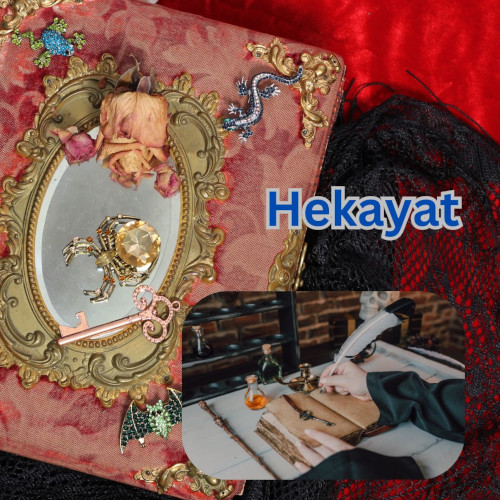Hekayat 40 from Golestan of Saadi

English Translation for Hekayat
A king was given a Chinese slave girl. He wanted to be with her while he was drunk, but she resisted. The king became angry and gave her to a black servant whose upper lip extended beyond his nostrils and whose lower lip hung down to his chest. His appearance was so frightful that even demons would flee from him, and his armpits smelled so bad that even the purest water would stink.
You would think that ugliness was sealed on him until the Day of Judgment
And beauty was sealed on Joseph
As the witty have said:
A person so hideous
That his ugliness cannot be described
And then his armpits, God forbid
Smelled like a corpse in the summer sun
It is said that during that time, the black servant was driven by desire and lust; his affection grew, and he broke the seal. In the morning, when the king looked for the slave girl and did not find her, they told him the story. He became furious and ordered that the black servant and the slave girl be tied together and thrown from the palace roof into the moat. One of the good-natured ministers prostrated himself and said, “The poor black servant is not at fault, for all servants and workers are accustomed to the master’s kindness. If you had delayed the negotiation for one night, what would have happened? I would have consoled him with more than the value of the slave girl.” The king said, “O Lord of the Earth! Have you not heard?”:
When a thirsty person reaches a clear spring
Do not think he will fear a raging elephant
A starving heretic at an empty table
Reason does not believe he will think of Ramadan
The king liked this witticism and said, “Now I forgive the black servant; what should I do with the slave girl?” He replied, “Forgive the slave girl to the black servant, for she is now suitable only for him.”
Never wish for a friend
To go to an undesirable place
A thirsty person will not desire pure water
That has been half-drunk by a foul mouth.
متن حکایت
یکی را از مُلوک، کنیزکی چینی آوردند. خواست تا در حالتِ مستی با وی جمع آید. کنیزک ممانعت کرد. مَلِک در خشم رفت و مر او را به سیاهی بخشید که لبِ زِبَرینش از پَرّهِٔ بینی درگذشته بود و زیرینش به گریبان فرو هشته. هَیکلی که صَخْرالجِنّ از طلعتش بِرَمیدی و عَیْنالقَطْر از بغلش بگندیدی.
تو گویی تا قیامت زشترویی
بر او ختم است، و بر یوسف نِکویی
چنان که ظریفان گفتهاند:
شخصی، نه چنان کَریهْمنظر
کز زشتیِ او خبر توان داد
آنگه بغلی، نَعُوُذ بِاللّٰه
مردار به آفتاب مرداد
آوردهاند که سیه را در آن مدت، نفس طالب بود و شهوت غالب؛ مِهرش بجنبید و مُهرش برداشت. بامدادان که مَلِک، کنیزک را جُست و نیافت، حکایت بگفتند. خشم گرفت و فرمود تا سیاه را با کنیزک استوار ببندند و از بام جوسق به قعر خندق در اندازند. یکی از وزرای نیکمحضر روی شفاعت بر زمین نهاد و گفت: سیاه بیچاره را در این خطایی نیست که سایر بندگان و خدمتکاران به نوازش خداوندی مُتَعوِدند. گفت: اگر در مفاوضهٔ او شبی تأخیر کردی، چه شدی؟ که من او را افزون از قیمت کنیزک دلداری کردمی. گفت: ای خداوند روی زمین! نشنیدهای؟:
تشنهٔ سوخته در چشمهٔ روشن چو رسید
تو مپندار که از پیلِ دَمان اندیشد
مُلْحِدِ گُرْسِنِه در خانهٔ خالی بر خوان
عقل باور نکند، کز رمضان اندیشد
مَلِک را این لَطیفه پسند آمد و گفت: اکنون سیاه تو را بخشیدم؛ کنیزک را چه کنم؟ گفت: کنیزک، سیاه را بخش که نیمخوردهٔ او، هم او را شاید.
هرگز آن را به دوستی مپسند
که رود جایِ ناپسندیده
تشنه را دل نخواهد آبِ زُلال
نیمخوردِ دهانِ گندیده


